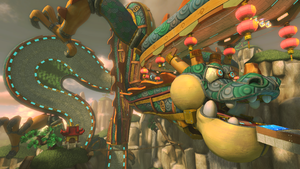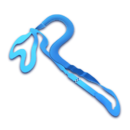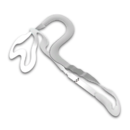Dragon Driftway
| Dragon Driftway | |||||||||||||||
|---|---|---|---|---|---|---|---|---|---|---|---|---|---|---|---|

| |||||||||||||||
| Information | |||||||||||||||
| Appears in | Mario Kart 8 (DLC Pack 1) (2014) Mario Kart 8 Deluxe (2017) | ||||||||||||||
| Cup(s) | Egg Cup | ||||||||||||||
| Based on | Gobblegut | ||||||||||||||
| Online play | No longer available (Wii U) Available (Switch) | ||||||||||||||
| |||||||||||||||
| |||||||||||||||
| |||||||||||||||
Dragon Driftway is a race course included with The Legend of Zelda × Mario Kart 8 downloadable content in Mario Kart 8, as well as the base content of Mario Kart 8 Deluxe, as the third course of the Egg Cup. The course is Chinese-themed, taking place in and around a statue of a dragon that is based on Gobblegut, though it has legs. Throughout the course, various statues and murals of Lakitu appear. The dragon structure in this race course never actually ends with its tail, as it loops back to the start. This may be a reference to the ancient cultural symbol of the ouroboros, depicting a snake eating its own tail.
Similar to Mario Circuit, almost the entirety of the course is played in anti-gravity, with only the beginning and end segments near the start/finish line having normal gravity. The music for this course is included in Super Smash Bros. Ultimate as a track, and the Mario Kart 8 Deluxe battle course Dragon Palace uses a modified version of the music. The second part of the song has a melody that resembles the theme for the Chai Kingdom from Super Mario Land.
Course layoutEdit
At the beginning of the race, racers drive into the mouth of the dragon and go down a winding hall, modeled after Chinese temples. Throughout the tunnels, images from the original Super Mario Bros. can be seen at the top of the walls. After a set of zigzagging turns, players exit the dragon, although they continue to drive on its exterior. Following this is another series of winding turns, though there are shortcuts placed between them (one acting as an offroad ramp and the other serving as a patch of offroad). After this is a bridge twisting racers fully upside-down, before a prolonged left turn followed by a right turn. There are some Spin Boost Pillars found here, which have a unique design resembling hyōtan gourds. Then, racers are faced with a series of descending bumps in the road that function as ramps, giving racers an opportunity to perform tricks. There is then one final turn with another patch of offroad taking up the track to the right (forcing racers without speed items to go to the left) before a final dropoff ramp, ending the anti-gravity section and leading towards the finish line.
The track features several references to Lakitus and Chinese culture. The starting line is a paifang, a type of gate widely found in Chinese culture, with two golden Cheep Cheeps on top of it. This is also seen in the Super Mario 3D World stage Hands-On Hall. Three Chinese characters ("朱盖木 - Zhūgàimù") referencing Lakitu's name in simplified Chinese can be found on the lanterns above the starting line or on the murals. One of the Lakitu images in the tunnel depicts one holding a staff and riding a cloud. This is similar to Sun Wukong, a character who rides a cloud and uses a staff in the Chinese novel Journey to the West. Before a part with multiple Spin Boost Pillars, there are six unique lanterns with the design of the Lakitu Card from the Club Nintendo Hanafuda Cards reward.[1]
Mario Kart 8 Original Soundtrack liner notesEdit
"We used a Chinese stringed instrument known as an erhu for this track. The contrast between this instrument and the same melody played on an electric guitar works really well. Underpinning this, you have the slap bass and the four-to-the-floor beat. When you add that forceful melody, it somehow sounds like a shamisen."
GalleryEdit
Link at the starting line, waiting for the green light
An anti-gravity section of the track with hanging lanterns
Baby Luigi on a portion of the track
Baby Luigi about to drop a banana before the anti-gravity spinners
Baby Luigi performing a trick above the start/finish line
Baby Luigi performing a trick before crossing the finish line
Baby Luigi about to enter the dragon's mouth
A Lakitu in a Kung Fu pose in the background
A Lakitu mural in the background
Names in other languagesEdit
| Language | Name | Meaning | Notes |
|---|---|---|---|
| Japanese | ドラゴンロード[?] Doragon Rōdo |
Dragon Road | |
| Chinese (simplified) | 龙盘之路[?] Lóngpán Zhī Lù |
Dragon Spiral Road | |
| Chinese (traditional) | 龍盤之路[?] Lóngpán Zhī Lù |
Dragon Spiral Road | |
| Dutch | Drakendreef[?] | Dragon Road | |
| French | Route du dragon[?] | Dragon Road | |
| German | Große Drachenmauer[?] | Great Dragonwall | |
| Italian | Muraglia del Drago[?] | Dragon Wall | |
| Korean | 드래곤 드리프트 로드[?] Deuraegon Deuripeuteu Rodeu |
Dragon Drift Road | |
| Portuguese | Estrada do Dragão[?] | Dragon's Road | |
| Russian | Дорога дракона[?] Doroga drakona |
Dragon Road | |
| Spanish | Ruta Dragón[?] | Dragon Route |
TriviaEdit
- The various poses of the Lakitu statues on this course match that on the Kung Fu Lakitu poster seen in GBA Ribbon Road, which in turn, is a reference to Kung Fu Panda.
- The course has a unique sound effect during the opening sequence; high-pitched Chinese gongs can be heard after the introduction fanfare ends.
- This is one of three courses in Mario Kart 8 Deluxe to have a unique fanfare, alongside Ninja Hideaway and DS Waluigi Pinball.


